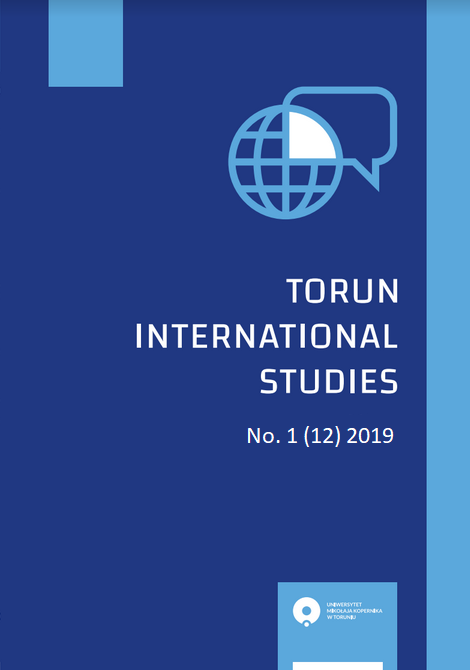PATTERNS OF THE MIGRATION DURING THE HYBRID WARFARE AND ITS CONFLICTOGENITY
DOI:
https://doi.org/10.12775/TIS.2019.004Keywords
migration, horizontal inequality, hybrid conflict, cognitive influence, propaganda, manipulative technologies, conflictogenityAbstract
The population’s tendency to protest or to get involved into conflict can be used as the method of the hybrid warfare in the targeted country or region. The frustrations are formed due to the actual or virtually created resentment in the community or among the population groups. The deterioration of the social and economic conditions and the lack of opportunities to change the life for the better as well as the growing sense of danger or the real threat to life and security – all these elements have caused the intensive migration processes in many regions of the world. As a result it is the main feature of the modern world to handle. The influx of refugees and migrants and settling down in the new areas cause the transformation of horizontal inequality among the migrants themselves and between migrants and locals. The intensification of the migration processes is a result from the peculiarities of the hybrid conflicts such as the powerful cognitive, information and psychological influence, use of different technologies including the manipulative ones. The possibility to manage the migration processes and, to a certain extent the migrants’ potential for conflict is becoming the feasible instrument to break down the system of regional and international security through the projection of conflicts to the places where the migration flows are directed.
References
Akhmedova, K.B. (2004). Posttravmaticheskije lichnostnije izmenenija u grazhdanskikh lyts, perezhivshikh ugrozu zhizni. Voprosy psikhologii, 3, 93–102 (in Russian).
Bojko, О.D. (2010). Politychne manipuljuvannja. Kyiv: Academiia. (in Ukrainian).
Brennan, E. (1999). Population, Urbanization, Environment, and Security: A Summary of the Issues, Washington.
Chauvet, L. & Collier, P. (2005). Development Effectiveness in Fragile States: Spillovers and Turnarounds. Retrieved June 18, 2019, from http://www.eldis.org/static/DOC16180.htm.
Crawford, M. & Campbell, B. (Eds.). (2012). Causes and Consequences of Human Migration. An Evolutionary Perspective. Cambridge University Press.
Esty, D., Goldstone, J., Gurr T., Harff, B., Levy, M., Dabelko, G., Surko, P. & Unger, A. (1999). State Failure Task Force Report: Phase II Findings. Issue 5, Washington.
Danyk, Y. (2018). Development and implementation of a new concept of crisis situations syndrome: "syndrome of a hybrid war". Retrieved June 18, 2019, from http://eu-jr.eu/health/article/view-/797
Danyk, Y.G., Telelym, V.M. & Chmeljov, V.O. (2010). Osnovni aspect strategii preventyvnoji oborony ta ii realizatsija. Nauka i oborona, 2, 15–23 (in Ukrainian).
Danyk, Y. & Permiakov, O.Y. (2018). Modern information technologies in providing national security and defence: current state and development trends. Modern Information Technologies in the Sphere of Security and Defence, 1(31), pp.159-176;
Danyk, Y. & Gudz, S. (2015). Special operations for disruption of state and military control system. Security and Defence Quarterly, 4(9).
Danyk, Y., Maliarchuk, T. & Briggs, Ch. (2017). Hybrid War: High-tech, Information and Cyber Conflicts. Connections: The Quarterly Journal, 16(2), pp. 5–24.
Danyk, Y.G. & Shestakov, V.I. (2018). Osoblyvosti vedennia bojovykh dij u vysokourbanizovanikh rajonakh ta shliakhy zmenshennia vtrat sered tsyvilnogo naselennia. Nauka i oborona, 3, pp. 30-37 (in Ukrainian).
Danyk, Y.G., Telelym, V.M. & Chmeljov, V.O. (2008). Preventyvna oborona jak vyd strategichnykh dij. Nauka i oborona, 4, 34–41 (in Ukrainian).
Forced displacement worldwide. (2017). Retrieved June 18, 2019, from https://www.unhcr.org/news/stories/2017/6/5941561f4/forced-displacement-worldwide-its-highest-decades.html
Gurr, T. (1970). Why men rebel. Princeton: Princeton University Press.
Hoffman, F. (2007). Conflict in the 21st century: The rise of hybrid wars. Arlington: Potomac Institute for Policy Studies.
Hoffman, F. (2009). Hybrid Warfare and Challenges. Joint Force Quarterly, 52, pp. 34–39.
Horbulin, V.P. (Ed.). (2017). Svitova hibrydna viina: ukrainskyi front: kolekt. Kyiv: Natsionalnyi Instytut Stratehichnykh Doslidzhen. [in Ukrainian].
IOM. (2018a). Global Migration Indicators. Retrieved June 18, 2019, from http://publications.iom.int/system/files/pdf/global_migration_indicators_2018.pdf
IOM. (2018b). World Migration Report, Internally displaced people. Retrieved June 18, 2019, from http://publications.iom.int/system/files/pdf/wmr_2018_update_idps.pdf
Kara-Murza, S.G. (2005). Manipuljatsiia soznaniem. Moskva: Eksmo. (in Russian).
Koppell, C. & Sharma, A. (2003). Preventing the Next Wave of Conflict – Understanding Non-Traditional Threats to Global Stability. Washington.
Lazebnaia, Y.O. & Zelenova, M.Y. (1999). Vojenno-travamaticheskij stress: osobennosti posttravmaticheskoj adaptatsii uchastnikov bojevykh dejstvij. Psikhologicheskij Zhurnal, 20 (5), pp. 62–74 (in Russian).
Mattis, J.N. (2005). Future Warfare: The Rise of Hybrid Wars. Proceedings, November, pp. 18–19.
McCuen, J.J. (2008). Hybrid Wars. Military Review, April-May, pp. 107–113.
Predstavnytstvo MOM v Ukrajini. (2016). Migratsiia v Ukraine: Fakty i tsyfry. (in Ukrainian).
Miller Clyde, R. (1946). The Process of Persuasion. New York: Crown Publisher.
Murray, W. & Mansoor, P. (2012). Hybrid Warfare: Fighting Complex Opponents from the Ancient World to the Present. New York: Cambridge University Press.
Natsionalna systema monitoryngu sytuatsiji z vnutrishnjo peremishchenymy osobamy (2016). Mizhnarodna organizatsija z migratsii. Retrieved June 18, 2019, from http://www.iom.org.ua/sites/default/files/iom_nms_cumulative_report_ukr.pdf (in Ukrainian).
Ostby, G. (2008). Polarization, horizontal inequalities and violent civil conflict. Journal of Peace Research, 45(2), рр.143-162.
Poznjak, O. & Libanova, Y. (2010). Naselennja Ukrajiny. Trudova emigratsija v Ukrajini. Instytut demografii ta sotsialnykh doslidzhen’ imeni M.V. Ptukhy NAN Ukrajiny (in Ukrainian).
Rushchenko, I.P. (2015). Pidryvni sotsial’ni tekhnologiji u strukturi gibrydnoji vijny. Pravo i bezpeka, 2 (57), (in Ukrainian).
Shyller, G. (1980). Manipuliatory soznanijem. Moskva: Mysl. (in Russian).
Sljusarevskyj, M.M. & Blynova, O.Y. (2013). Psykhologija migratsii. Kyrovograd: Instytut sotsial’noji ta politychnoji psykhologii NAPN Ukrajiny. (in Ukrainian).
Stewart, F. (2000). Crisis prevention: Tackling horizontal inequalities. Oxford Development Studies, 28(3), pp. 245–262.
Thomson, O. (1999). Easily led: A history of propaganda. Sutton: Phoenix Mill.
UNICEF. (2017). Refugee and Migrant Crisis in Europe Humanitarian Situation Report. Retrieved June 18, 2019, from https://www.unicef.org/appeals /files/
UNCHR. (2017a). Press Coverage of the Refugee and Migrant Crisis in the EU: A Content Analysis of Five European Countries Report prepared for the UNHCR. Retrieved June 18, 2019, from https://www.unhcr.org/56bb369c9.pdf
UNCHR. (2017b). Global Report 2017. Retrieved June 18, 2019, from http://reporting.unhcr.org/sites/default-files/gr2017/pdf/GR2017_English_Full_lowres.pdf
Downloads
Published
How to Cite
Issue
Section
Stats
Number of views and downloads: 965
Number of citations: 0



